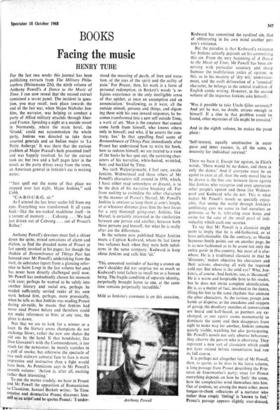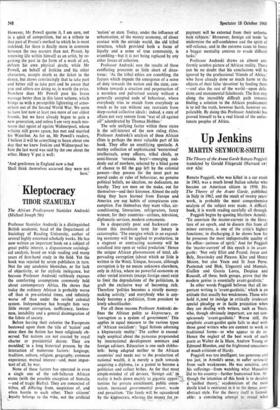Facing the music BOOKS
HENRY TUBE
For the last two weeks this journal has been publishing extracts from The Military Philo- sophers (Heinemann 25s), the ninth volume of Anthony Powell's A Dance to the Music of Time. I can now reveal that the second extract contained a secret panel. The incident in ques- tion, you may recall, took place towards the end of the last war, when Major Nicholas Jen- kins, the narrator, was helping to conduct a party of Allied military attaches through liber- ated France. Spending a night at a seaside resort in Normandy, .where the main hotel, the `Grand,' could not accommodate the whole party, Jenkins was directed to take three assorted generals and an Indian major to `La Petite Auberge.' It was there that the curious problem of Major Prasad's bath presented itself and was happily resolved. So far the extract took us; but two and a half pages later in the novel, as the party drives away from the town, an American general in Jenkins's car is making notes: "'Just spell out the name of that place we stopped over last night, Major Jenkins," said Cobb.
"C-A-B-O-U-R-G, sir."
As I uttered the last letter scales fell from my eyes. Everything was transformed. It all came back—like the tea-soaked madeleine itself—in a torrent of memory ... Cabourg. ... We had just driven out of Cabourg . .. out of Proust's Balbec.'
Anthony Powell's devotees must feel a shiver down the spine, mixed sensations of alarm and elation, to find the dreaded name of Proust at last openly invoked in his pages; for though the shadow of Remembrance of Things Past has hovered over Mr Powell's undertaking from the start, its substance (apart from a glancing refer- ence to Saint Loup in the last volume but one) has never been directly challenged until now. Mr Powell has undoubtedly chosen his moment with care; perhaps he wanted to be safely into another literary and social era, perhaps he needed sufficiently serried ranks of his own work behind him, perhaps, more prosaically, when he tells us that Jenkins was reading Proust during air-raids, he means that Jenkins had never read Proust before and therefore could not make references to him; at any rate, the glove is down.
Not that we are to look for a winner or a loser. In the literary arena champions do not exchange blows, rather the new one shakes the old one by tht hand. If that handshake, like Don Giovanni's with the Cernmendatore, is too much for the newcomer, he merely vanishes in a puff of smoke, but otherwise the spectacle of two such stalwart samurai face to face is more impressive and instructive than a fight would have been. As Pennistone says in Mr Powell's seventh volume: 'Action is, after all, exciting rather than interesting.'
To put the matter crudely, we have in Proust and Mr Powell the opposition of Romanticism to Classicism. Samuel Beckett writes: 'In Time creative and destructive Proust discovers him- self as-an artist'-und he quotes Proust: 'I under-
stood the meaning of death, of love and voca- tion, of the joys of the spirit and the utility of pain.' For Proust, then, his work is a form of personal redemption, in Beckett's words 'a re- ligious experience in the only intelligible sense of that epithet, at once an assumption and an annunciation.' Swallowing, as it were, all the outside stimuli, persons and things, and digest- ing them with his own inward responses, he be- comes transformed into a new self outside Time, a work of art. `Man is the creature that cannot come forth from himself, who knows others only in himself, and who, if he asserts the con- trary, lies.' In that appalling final scene of Remembrance of Things Past, immediately after Proust has understood how to write his book, how to redeem himself, we are treated to a view of the husks he has spat out, the surviving char- acters of his narrative, white-haired, wrinkled, bent and buckled by Time.
No such Walpurgisnacht, I feel sure, awaits Jenkins, Widmerpool and those others of Mr Powell's characters still around in 1956, which, I have either read somewhere or dreamt, is to be the date of his narrative breaking off. Far from seeking to assimilate the other characters in the manner of Proust's Marcel, Mr Powell's Jenkins is anxious to keep them at arm's length, or at whatever distance gives himthe best focus for a very thorough going-over. Jenkins, like Marcel, is certainly interested in the similarities between one person and another, between both those persons and himself, but what he is really after are the differences.
In the volume now published Major JenkinS meets a Captain Kedward, whom he last knew two volumes back when they were both subal- terns in the same company. Kedward is hazy about Jenkins and calls him 'sir.'
`This unwonted reminder of having a crown on one's shoulder did not surprise me so much as Kedward's total failure to recall me as a human being. The fragile condition of separate identity, perpetually brought home to one, at the same time remains perpetually incredible.'
Mild as Jenkins's comment is on this occasion, Kedward has committed the cardinal sin, that of obliterating in his own mind another per- son's existence.
But the paradox is that Kedward's existence for Jenkins actually depends on his committing this sin. From the very beginning of A Dance to the Music of Time, Mc Powell has been ob- serving with particular accuracy and sharp humour the multifarious antics of egoism; in this, as in his mastery of 'dry wit,' understate- ment, and the swift delineation of a 'rounded' character, he belongs to the central tradition Jf English comic writing. However, in the second volume of the sequence Jenkins asks himsell: Was it possible to take Uncle Giles seriously? And yet he was, no doubt, serious enough to himself. If a clue to that problem could be found, other mysteries of life might be revealed.'
And in the eighth volume, he makes the point plain : Self-interest, equally unattractive in outer guise and inner essence, is, all the same, a necessity for individual survival.'
There we have it. Except for egoism, in Eliot's words, 'There would be no dance, and there is only the dance.' And if everyone must be an egoist to exist at all, then the only moral line to be drawn is the fine one between those egoists like Jenkins who recognise and even appreciate other people's egoism and those like Widmer- pool and Kedward who do not. This is what makes Mr Powell's novels so specially enjoy- able, that seeing the world through Jenkins's unblinking eyes we come to feel ourselves as generous as he is, tolerating even bores and swine for the sake of the small pearl of indi- viduality which each one secretes.
To say that Mr Powell is a classicist might seem to imply that he is old-fashioned, or at least unfashionable. On the contrary, as Martin Seymour-Smith points out on another page, he is so new-fashioned as to be avant not only the entire garde in this country, but most of it else- where. He is a traditional classicist in that he 'distances,' makes objective his characters and their actions, observing all with the required cold eye. But whose is the cold eye? Why, Jen- kins's, of course. And Jenkins, too, is 'distanced.' He is a warm and hospitable host to his reader, but he does not invite complete identification. He is, as a matter of fact, involved in the dance, lifting his feet to the same rhythms that animate the other characters. As the various groups join hands or disperse, as the anecdotes and snippets of gossip, the desultory snatches of conversation are heard and half-heard, as partners are ex- changed, as one egoist seems momentarily to dominate the scene and then disappears from sight to make way for another, Jenkins remains quietly visible, watching but also participating. Mr Powell's novels not only observe behaviour, they observe the person who is observing. They represent a new sort of classicism which could not have existed before romanticism had run its full course.
It is perhaps not altogether fair of Mr Powell, then, to quote, as he does in his latest volume, a long passage from Proust describing the Prin- cesse de Guermantes's party; since for Proust everything depends on how he 'feels' the scene, how the complexities wind themselves into him. Out of context, set among the more sober, more tongue-in-cheek reflections of a narrator who rather than simply 'feeling' is 'known to feel,' Proust's passage appears slightly over-dressed. However, Mr Powell quotes it, I am sure, not in a spirit of competition, but as a tribute to that part of Proust's method to which he is most indebted; for there is finally more in common between the two masters than not. Proust, by renewing life within himself as an artist, by re- gaining the past in the form of a work of art, defeats his own physical death; while Mr Powell, on behalf of Jenkins and his other characters, accepts death as the ticket to the dance, but shows convincingly that to take part and better still to take part and be aware that you and others are doing so, is worth the price. Nowhere does Mr Powell pass his brave message better than in this latest volume, which brings us-with a perceptible lightening of atmo- sphere out of the Second World War. We seem to have lost now at least two more of our oldest friends, but we have already begun to gain a new generation, and unless I am very much mis- taken- that egoist of egoists Widmerpool, whose villainy still grows apace, has met and married his Waterloo. As for us, Mr Powell's readers, I believe it will be something to boast about one day that we knew Jenkins and Widmerpool be- fore the last word was said by the one about the other. Henry V put it well: 'And gentlemen in England now a-bed Shall think themselves accursed they were not here.'







































 Previous page
Previous page